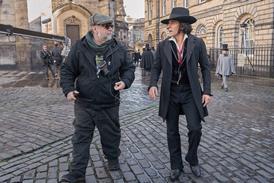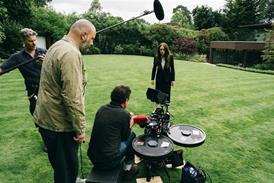The Golden Globe nominee talks about the process of making The Social Network, and the creative freedom on the current shoot for Spider-Man.
Andrew Garfield has already earned a Golden Globe nomination for Best Supporting Actor for his role as Eduardo Saverin in The Social Network.
The 27-year-old actor, a former Screen International Star of Tomorrow, previously stirred buzz for his roles in projects including Boy A, The Red Riding Trilogy and The Imaginarium of Doctor Parnassus and also stars as the tragic Tommy in Never Let Me Go,. He is currently busy stepping into the spidey suit as he becomes the new incarnation of Peter Parker/Spider-Man; Marc Webb’s new take on the franchise is shooting now in Los Angeles.
When you got the script for The Social Network, did it jump off the page at you? With Eduardo, did you know immediately how you were going to play him?
When I read the script it was incredibly eloquent, Aaron Sorkin’s voice is so distinct. There was so much detail and specificity to each character he wrote.
I auditioned a few times, and I read for Mark [Zuckerberg], who Jesse [Eisenberg] ultimately played. I kind of got into that headspace of figuring out who Mark was, what his intentions were. So I spent three weeks feeling like I was starting to get a grip on who he was. And after final auditions, Aaron called me into his office and said, ‘What do you think of Eduardo?’
That was kind of jarring, but then what was wonderful was when I started working on Eduardo, I started realising one of the elements of Eduardo – especially in his relationship with Mark — is that he feels like he understands Mark better than anyone else does. I had thought about who Mark was with quite a lot of depth, it really helped in that situation.
I had to wrap my head around Eduardo. What’s really wonderful about the script is that it’s everyone’s experience in the script is correct. Once you’ve had one person’s side of the story in mind, it’s hard to play the other side of the story. But in the same breath, it’s [a script where] everyone is right and everyone is wrong. That’s why the movie is so special, it doesn’t manipulate you towards any one opinion or any one person, or any one action. It allows the audience to find out where their own moral center lies and reflect on what they would have done in that situation.
Did your take on Eduardo change as you were shooting?
All of us ultimately needed to back ourselves, we all had to back our own character’s perspective, and to fight for it tooth and nail, in order for the drama to work. It had to feel like they were the authority on the truth of the situation, or the truth of the argument. So I got more and more impassioned as shooting went on. Eduardo does behave badly with the action that he takes shutting down the joint account, and I really struggled with that. I knew what would happen because of that, and I’m sure Eduardo struggled with it when he did it. I’m sure he felt sick afterwards, it was a childish move. And I’m sure after he was dropped from the company he regretted that more than anything. But he probably felt he had no choice, and that way he could go into the desposition feeling self righteous. It’s complex and rich. Eduardo’s flawed just like anyone else.
Why do you think this story has struck such a nerve with people? Did you expect that?
Not at all, I’m really rubbish at predicting trends or what people will like or respond to. It’s been very surprising to me, a response like this is very rare. It’s brilliant to make a film that people respond to. Also I’ve found out very quickly that you can’t second-guess any response whatsoever. You just want to be involved with people who care about it as much as you.
With [The Social Network] the whole process of making the film was incredible. The whole act of making the film was enough.
What was it like working on set with David Fincher? Does he give actors a lot of direction, or does he let you do your own thing?
The defining feature in working with David is that he gives you a lot of takes. I loved it, I absolutely adored it. It becomes second nature that there is a camera there, you forget about it, you stop acting. Also if you know you have 70 takes to go, you’re not going to ‘try to get it right,’ you’re just going to be there in the moment and things will happen spontaneously. That’s much more exciting than trying to watch an actor get every single moment of the scene ‘right’ and tick boxes. I do that a lot and I always beat myself up for it, it doesn’t feel truthful and there’s nothing alive about it.
So David gave us that freedom to play and not be afraid of making mistakes. And also we trusted him that if we fell on our faces he wouldn’t put it in the film, unless it served the story. With David, it’s all to serve the story, there’s nothing superfluous. He was warmly guiding for each actor, he kind of pitted us against each other in a very subtle way, like I was talking about earlier, he made sure we all felt impassioned about our character’s perspective in each scene so that we would all clash. So he understood everyone’s perspective and could get behind each one of us.
I imagine that sense of freedom of working like that isn’t as possible in Spider-Man. Has it been a big adjustment to that level of filmmaking, how is it going so far?
It’s going good actually. It’s been a lot of fun, but Holy Christ it’s a lot of work. It’s like using seven different parts of your brain at once which is really interesting. I’m having a lot of fun, I’m enjoying it. The freedom you’re talking about, I still feel. I don’t feel hemmed in or tied down. I feel like I do have room to play, I feel wonderful about everyone involved – the cast, the director (Marc Webb). Touch wood, I don’t want to speak too soon, but so far it’s been really pleasant and creative. I think everyone wants it to be like that. Everyone is feeling like we want to do something other than what’s already been seen. There’s an exploration going on in this film.




















1 Readers' comment